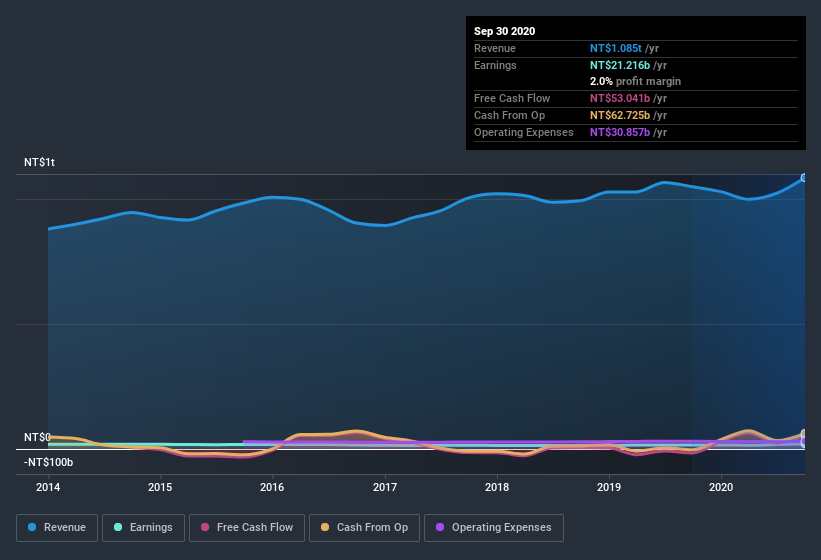- Taiwan
- /
- Tech Hardware
- /
- TWSE:2382
Is There More To The Story Than Quanta Computer's (TPE:2382) Earnings Growth?

Broadly speaking, profitable businesses are less risky than unprofitable ones. That said, the current statutory profit is not always a good guide to a company's underlying profitability. In this article, we'll look at how useful this year's statutory profit is, when analysing Quanta Computer (TPE:2382).
While Quanta Computer was able to generate revenue of NT$1.09t in the last twelve months, we think its profit result of NT$21.2b was more important. Happily, it has grown both its profit and revenue over the last three years, as you can see in the chart below.
Check out our latest analysis for Quanta Computer

Importantly, statutory profits are not always the best tool for understanding a company's true earnings power, so it's well worth examining profits in a little more detail. Today, we'll discuss Quanta Computer's free cashflow relative to its earnings, and consider what that tells us about the company. That might leave you wondering what analysts are forecasting in terms of future profitability. Luckily, you can click here to see an interactive graph depicting future profitability, based on their estimates.
Zooming In On Quanta Computer's Earnings
As finance nerds would already know, the accrual ratio from cashflow is a key measure for assessing how well a company's free cash flow (FCF) matches its profit. In plain english, this ratio subtracts FCF from net profit, and divides that number by the company's average operating assets over that period. The ratio shows us how much a company's profit exceeds its FCF.
Therefore, it's actually considered a good thing when a company has a negative accrual ratio, but a bad thing if its accrual ratio is positive. That is not intended to imply we should worry about a positive accrual ratio, but it's worth noting where the accrual ratio is rather high. That's because some academic studies have suggested that high accruals ratios tend to lead to lower profit or less profit growth.
Over the twelve months to September 2020, Quanta Computer recorded an accrual ratio of -0.22. Therefore, its statutory earnings were very significantly less than its free cashflow. In fact, it had free cash flow of NT$53b in the last year, which was a lot more than its statutory profit of NT$21.2b. Given that Quanta Computer had negative free cash flow in the prior corresponding period, the trailing twelve month resul of NT$53b would seem to be a step in the right direction.
Our Take On Quanta Computer's Profit Performance
As we discussed above, Quanta Computer's accrual ratio indicates strong conversion of profit to free cash flow, which is a positive for the company. Based on this observation, we consider it possible that Quanta Computer's statutory profit actually understates its earnings potential! And on top of that, its earnings per share have grown at 43% per year over the last three years. The goal of this article has been to assess how well we can rely on the statutory earnings to reflect the company's potential, but there is plenty more to consider. If you want to do dive deeper into Quanta Computer, you'd also look into what risks it is currently facing. While conducting our analysis, we found that Quanta Computer has 1 warning sign and it would be unwise to ignore this.
This note has only looked at a single factor that sheds light on the nature of Quanta Computer's profit. But there are plenty of other ways to inform your opinion of a company. For example, many people consider a high return on equity as an indication of favorable business economics, while others like to 'follow the money' and search out stocks that insiders are buying. While it might take a little research on your behalf, you may find this free collection of companies boasting high return on equity, or this list of stocks that insiders are buying to be useful.
When trading Quanta Computer or any other investment, use the platform considered by many to be the Professional's Gateway to the Worlds Market, Interactive Brokers. You get the lowest-cost* trading on stocks, options, futures, forex, bonds and funds worldwide from a single integrated account. Promoted
Valuation is complex, but we're here to simplify it.
Discover if Quanta Computer might be undervalued or overvalued with our detailed analysis, featuring fair value estimates, potential risks, dividends, insider trades, and its financial condition.
Access Free AnalysisThis article by Simply Wall St is general in nature. It does not constitute a recommendation to buy or sell any stock, and does not take account of your objectives, or your financial situation. We aim to bring you long-term focused analysis driven by fundamental data. Note that our analysis may not factor in the latest price-sensitive company announcements or qualitative material. Simply Wall St has no position in any stocks mentioned.
*Interactive Brokers Rated Lowest Cost Broker by StockBrokers.com Annual Online Review 2020
Have feedback on this article? Concerned about the content? Get in touch with us directly. Alternatively, email editorial-team@simplywallst.com.
About TWSE:2382
Quanta Computer
Manufactures and sells notebook computers in Asia, the Americas, Europe, and internationally.
Exceptional growth potential with outstanding track record and pays a dividend.


